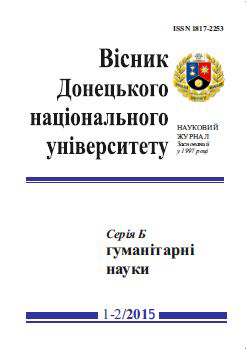Від єресі до догми: передісторія категорії «світогляд».
Ключові слова:
ἀϊρεσις, δογμα, єресь, догма, догматика, світогляд, «космотеорія», теологія, християнство, філософіяАнотація
У статті розкриваються особливості тлумачення термінів «єресь (ἀϊρεσις)» та «догма (δογμα)» у контексті динаміки європейської філософсько-теологічної думки у епоху пізньої античності та початку середньовіччя. Встановлюється співвідношення їх змістів з категорією «світогляд». Визначаються докорінні вербально-змістовні метаморфози їх інтерпретації в давньогрецькій філософії та вченнях отців церкви.Посилання
Хайдеггер М. Основные проблемы феноменологии. / М. Хайдеггер; перевод с нем. А. Г. Чернякова. – СПб: Высшая религиозно-философская школа, 2001. – 445 с.
Секст Эмпирик. Три книги Пирроновых положений // Сочинения в двух томах. – Т.2. / Секст Эмпирик; вступит. ст. и пер. с древнегреч. А.Ф. Лосева – М.: Мысль, 1976. – С. 207-380.
Черноволенко В. Ф. Мировоззрение и научное познание / В.Ф. Черноволенко. – К.: Изд. Киевского ун-та, 1970. – 171 c.
Арістотель. Нікомахова етика / Арістотель; [пер., коментарі В. Ставнюк]. – К.: Аквілон-Плюс, 2002. – 256 с.
Болотов В. В. История Церкви в период вселенских соборов. / В. В. Болотов – М.: Поколение, 2007. – 720 с.
Святе Письмо Старого та Нового Завіту. Повний переклад, здійснений за орігинальними єврейськими, арамейськими та грецькими текстами. – Ukrainian Bible 63 DC : United Bible Societies, 1991. – 1394 с.
Евсевий Памфил. Жизнь блаженного василевса Константина. / Евсевий Памфил; Пер. СПбДА под ред. А.А.Калинина – М. Лабарум. 1998. – 351 с.
Платон. Тимей // Платон. Собрание сочинений в 4 т.: Т.3 / Платон; Пер. с древнегреч.; Общ. ред. А. Ф.Лосева, В. Ф. Асмуса, А. А. Тахо-Годи; Авт. вступит. ст. и ст. в примеч. А. Ф.Лосев; Примеч. А. А. Тахо-Годи. – М.: Мысль, 1994. – (Философское наследие) – С. 421 – 500.
Викентий Лиринский, преп. О Священном Предании Церкви / преп. Викентий Лиринский. – СПб.: Свиток, 2000. – 540 с.

